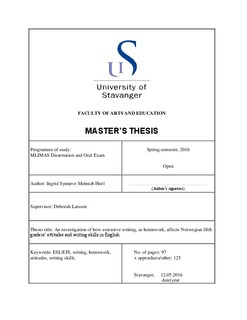| dc.description.abstract | This thesis is an investigation of how extensive writing, as homework, affects Norwegian fifth graders’ attitudes and writing skills in English. To investigate this, data was collected from two fifth grade classes of children, aged 9-10, at two different primary schools; one intervention group, which was included in an intervention study, and one control group.
One of the reasons behind this study was the experience that writing instruction in the language subjects Norwegian and English are being done differently in Norwegian schools. Whilst feedback on early writing in Norwegian is generally focused on positive aspects in order to motivate the pupils to write, feedback given on early writing in English is often focused on mistakes.
In the intervention study, the pupils were given a weekly writing task for homework throughout the semester, on topics linked to the pupils’ own lives, experiences and/or opinions. The pupils received positive feedback on content and text functions in their homework text, by the teacher giving praise to something interesting, fun or sad, in addition to how the information was presented. Good homework texts were read aloud in class. When it came to teaching, writing instruction as well as vocabulary learning were indirect. The lessons at school were mostly used for reading or talking activities, introducing new topics and doing individual or group activities.
The overall approach of this thesis was the use of mixed methods, using data triangulation, including text analysis, questionnaires and interviews. Both groups wrote a text and answered a questionnaire at the beginning and end of the research period. The texts were analysed according to the AYLLIT assessment scale, and the number of words they wrote were counted. Additionally, ten pupils from the intervention group were interviewed about their experience of the intervention study.
From the data acquired in this research, it was concluded that weekly writing, for homework, could indeed affect pupils’ attitudes and writing skills in English. Such writing improves how much pupils like to write, and how good they are at it. What it does not affect is how much, or for what purposes they write in English at home. Furthermore, it can be argued that the feedback and use of the homework tasks are equally important to the writing in itself. Finally, the results from this thesis can imply that what happens in the classroom, when it comes to writing instruction and vocabulary learning, might affect the pupils just as much. | nb_NO |

